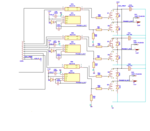bodmin636
Newbie level 4

Hi
I have designed an electric trolley that is powered by a 24v bldc motor with hall sensors. I am using a 16khz pwm to make the trolley silent running. It also has a brake function where if the trolley is going faster than the desired speed it ramps down the pwm until it reaches 0, it then applies pwm braking by shorting the phases to ground if the trolley is still going to fast. Motor can draw up to 16Amps and is current limited by the software.
Everything works well and as expected. BUT every now and again it will blow a pair of fets short circuit. I cannot reproduce this on my test bed but this happens on a few of the trolleys I have made and are being used. I have not been able to ascertain from the feedback from the users what they were doing when the trolleys fail.
Anybody have any ideas?
Fets are IRFB4110 and the schottky diodes are B160.

I have designed an electric trolley that is powered by a 24v bldc motor with hall sensors. I am using a 16khz pwm to make the trolley silent running. It also has a brake function where if the trolley is going faster than the desired speed it ramps down the pwm until it reaches 0, it then applies pwm braking by shorting the phases to ground if the trolley is still going to fast. Motor can draw up to 16Amps and is current limited by the software.
Everything works well and as expected. BUT every now and again it will blow a pair of fets short circuit. I cannot reproduce this on my test bed but this happens on a few of the trolleys I have made and are being used. I have not been able to ascertain from the feedback from the users what they were doing when the trolleys fail.
Anybody have any ideas?
Fets are IRFB4110 and the schottky diodes are B160.

